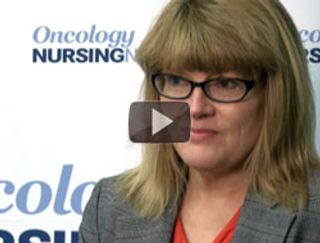
Lung Cancer
Latest News
Latest Videos

More News

Amivantamab plus chemotherapy nearly doubled the progression-free survival in patients with EGFR Exon 20-mutated non–small-cell lung cancer.

In the intention-to-treat population, the median progression-free survival was 24.8 months with selpercatinib vs 11.2 months.

Adjuvant alectinib significantly improved disease-free survival in patients with ALK-positive, early-stage, non–small-cell lung cancer.

Treatment with neoadjuvant nivolumab, followed by adjuvant nivolumab after surgery, led to significantly improved event-free survival in the first phase 3 perioperative study in patients with resectable non-small cell lung cancer.

Tarlatamab induced a 40% objective response rate among patients with pretreated small cell lung cancer—including many patients who had already received 3 lines of therapy.

Capmatinib and tepotinib are highly selective kinase inhibitors targeting MET.

The FDA has approved tests to identify patients with metastatic non–small cell lung cancer who are eligible for treatment with encorafenib plus binimetinib.

Cancer screening tests may not extend life expectancy; however, they still are valuable for public health.

The FDA has granted priority view to osimertinib plus chemotherapy based on data from the phase 3 FLAURA2 trial.

The FDA has approved pembrolizumab with platinum-containing chemotherapy for patients with resectable non–small cell lung cancer, in both the neoadjuvant and adjuvant setting.

The FDA has approved encorafenib plus binimetinib to treat adults with metastatic non-small cell lung cancer with a BRAF V600E mutation.

The approval of FoundationOne CDx as a companion diagnostic for selpercatinib seeks to broaden access to therapies for patients with RET fusion–positive solid tumors.

Takeda has announced that they will be voluntarily withdrawing mobocertinib for patients with EGFR exon 20 insertion mutation-positive non–small cell lung cancer.

The FDA Oncologic Drugs Advisory Committee voted 10-to-2 that findings from the phase 3 CodeBreaK 200 trial cannot be reliably interpreted.

Patients with EGFR-mutated non–small cell lung cancer had a median event-free survival of 30.8 months in the durvalumab arm and 19.6 months in the placebo arm.

The benmelstobart combination reduced the risk of death by 39% vs placebo plus chemotherapy in patients with extensive-stage small cell lung cancer.

The pathological complete response among patients who received durvalumab plus chemotherapy was 17.2% vs 4.3% in the placebo plus chemotherapy arm.

Findings from the PACIFIC-R trial showed that patients with EGFR-mutated non-small cell lung cancer experienced shorter progression-free survival with durvalumab than patients with EGFR-wildtype disease.

The confirmed objective response rate with repotrectinib was 79% among tyrosine kinase inhibitor (TKI)-naïve patients and 38% among TKI-pretreated patients.

The median progression-free survival was 25.5 months with osimertinib plus chemotherapy and 16.7 months with osimertinib alone.

The objective response rate with sacituzumab govitecan plus pembrolizumab was 56%.

Patrimumab deruxtecan garnered a 29.8% overall response rate in pretreated patients with EGFR-mutated non–small cell lung cancer.

TTFields therapy, when given in addition to standard systemic therapy, improved overall survival in patients with metastatic non–small cell lung cancer.

Adagrasib elicited a 1-year overall survival rate of 52.8% and 2-year rate of 31.3%.

The median progression-free survival with iruplinalkib was 27.70 months vs 14.62 months with crizotinib.




































